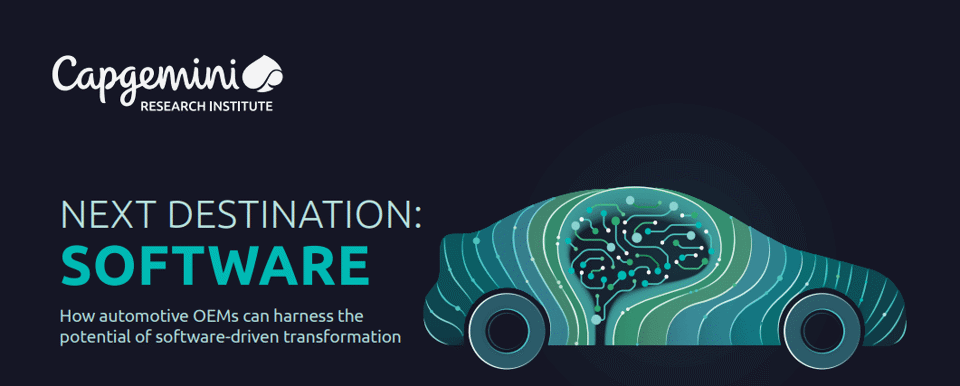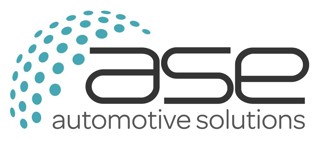Software-driven transformation is expected to help connectivity-embracing OEMs in automotive gain 9% higher market share on average than their peers.
A new report from the Capgemini Research Institute, ‘Next Destination: Software — How automotive OEMs can harness the potential of software-driven transformation,’ highlights how software-driven transformation is expected to deliver benefits for automotive OEMs in the next five years, such as such as improving productivity up to 40%, reducing costs by 37%, and improving customer satisfaction by 23%.
Despite this, nearly half (45%) of OEMs currently do not offer any connected services, and only 13% are monetising connected services.
Software-driven transformation is expected to help connectivity-embracing OEMs in automotive gain 9% higher market share on average than their peers.
A new report from the Capgemini Research Institute, ‘Next Destination: Software — How automotive OEMs can harness the potential of software-driven transformation,’ highlights how software-driven transformation is expected to deliver benefits for automotive OEMs in the next five years, such as such as improving productivity up to 40%, reducing costs by 37%, and improving customer satisfaction by 23%.
Despite this, nearly half (45%) of OEMs currently do not offer any connected services, and only 13% are monetising connected services.
Alexandre Audoin, group industry lead for automotive at Capgemini, said: “Software is redefining mobility and disrupting the entire automotive value chain.
“While the competition for innovation and growth undoubtedly lies within the vehicle, automotive manufacturers must not overlook the need to create a culture of agility and collaboration within the business.
“The new automotive era goes well beyond the vehicle and is unlocking new differentiators and opportunities in the manufacturing and business model.
“OEMs that want to succeed, grow their business and future-proof their organization need to adopt a broader lens – focusing as much attention on their internal operating model as well as software developments.”
The report states that half of OEMs (51%) expect to be known for providing software features, such as advanced driver-assistance systems (ADAS), self-driving, connectivity, and services as much as their automotive engineering excellence in the next five to ten years.
On average, the share of new vehicles per OEM to operate on a unified common software platform is expected to rise from 7% in 2021 to 35% in 2031.
But according to the report maturity in key areas remains low. Most OEMs (71%) are at the initial stages of their software-driven transformation, having only identified application areas.
Just 28% have implemented a pilot or proof of concept based on use cases for advancing transformation in specific areas.
The research finds that only 15% of OEMs are considered ‘frontrunners’ in transforming themselves by exhibiting the maturity to implement software-driven transformation.
Frontrunner OEMs believe that software-based revenue will account for 28% of their overall revenue by 2031.
OEMs will need to transition from legacy architecture, to realise the benefits of software and gain a competitive edge, Capgemini said.
Currently, 93% of OEMs have a traditional vehicle architecture, while only 13% have plans to decouple and separate the integrated hardware and software architecture deployment.
The research found that automotive executives expect the production of new vehicles supporting connected services and OTA updates to triple from 11% to 36% in the next five years, but only 4% of OEMs currently provide any kind of OTA update.
Capgemini said OEMs will require a robust ecosystem strategy to strike and scale partnerships to pursue standardisation of architecture, as well as the collection, use, ownership, and processing of both vehicle and consumer data.
Data ownership and cybersecurity still a concern
The research highlighted that less than 10% believe they are well prepared to implement cybersecurity measures, while 60% find it difficult to ensure products from suppliers meet safety and cybersecurity regulations.
Data domains enabled by software have the potential to add ‘intelligence’ to the automotive value chain, according to the research, yet nearly half (47%) of the OEMs do not collect or analyse vehicle data.
The research notes that OEMs should focus on maturing and monetising safety and security services.
Workforce upskilling key to realise ‘full potential’
Currently, OEMs are faced with a skills gap of 40-60% in areas such as software architecture, cloud management expertise and cybersecurity.
97% of executives surveyed believe that within the next five years, as much as 40% of their talent will need to possess the necessary skills in-house to deliver software-driven transformation.
To harness the full potential of software-driven transformation, OEMs are urged to focus their attention on new competences, transform legacy culture, redefine their processes around software and attract new talent, said Capgemini.
The full report is available on the Capgemini website.
Login to continue reading
Or register with AM-online to keep up to date with the latest UK automotive retail industry news and insight.






















Login to comment
Comments
No comments have been made yet.